In a Michigan College Town, Young Voters Offer Changes to Boost Mainstream Media’s Credibility
Editor’s note: This is the second in a two-part series on young voters’ views and use of media. Read part one on their media consumption habits and the issues they care about.
Nine college-age voters in Michigan’s Ingham County, classified as a College Town in the American Communities Project, suggest ways for the mainstream media to earn more credibility — chiefly by relying on straight facts, a place’s context, and primary source materials as well as highlighting positive news in communities.
- Video: How Young Voters in Michigan Consume News on Social and Mainstream Media
- Video: More on Young Voters’ Mainstream Media Concerns and How Mainstream Media Could Change
- Video: Young Voters on Media Bias and Suggestions for Mainstream Media
Eva Medill, 23, a senior at MSU
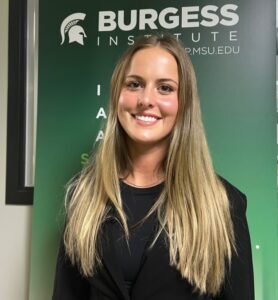
For Eva Medill, there’s a desire to see more context for the places where events are happening — she doesn’t like reporters speaking about things from afar. “I would recommend more in-person in the context. Journalists are there, videotaping and taking pictures,” she said.
Medill added that she wants to see more younger people reporting so she can better relate, rather than seeing newspeople in their 40s or 50s. “Nothing is wrong with that, but it’s nice to see someone at my age talking about these important issues. When you feel represented, you’re more inclined to pay attention,” she said.
Liam Richichi, 20, a junior at MSU
Liam Richichi said it’s difficult to give recommendations for mainstream media journalists because “humans are inherently biased.”
However, he expects to see more raw materials in stories for the reader to fact-check. “I want to see links to sources where news people found information. For example, there was testimony, and they gave a link to a video or written transcription of the testimony,” he said, adding that the readers would then have the information to interpret it.
Kyle Armbruster, 18, a freshman at MSU

Kyle Armbruster would like to see stories on mainstream media that show various sides of an issue. “It’s nice to see different opinions on a problem; their views could clash together, and it helps viewers form opinions based on that,” he said.
Elena Bradley Moorer, 21, a third-year student at MSU
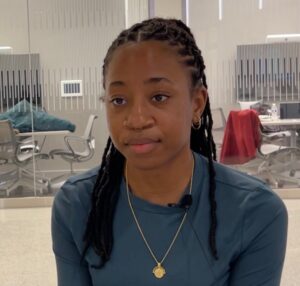
Elena Bradley Moorer said she worries about biased information in mainstream media, and she wants platforms to only present facts. Fox News and CNN have opposing biases, she said. Meanwhile, The New York Times may be biased, depending on who’s writing the stories and what topics the reporters are covering, she said.
Yesica Juarez, 23, a master’s student at MSU
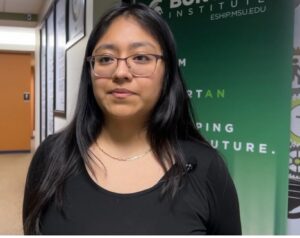
Similarly, Yesica Juarez wants reporters to stick to the facts, she said. For example, when a Latino man is in the news, she does not want to hear negative stereotypes about that specific person or that population group. “I want to see straight on what happened. There was a fire in this house, in this neighborhood,” she said.
Nam Phan, 22, a recent MSU graduate

As Nam Phan sees it, editors in newsrooms could help the reader understand issues better, but he finds that sometimes editors have their own biases, leading to a twisted version of a story. Phan also worries that editors could be bribed by people in high-level positions, leading to stories with lies.
To guard against that, he wants unedited articles from reporters who are at the scene. An example is what’s happening in Gaza. “Having unedited news would be better for us, so we can see the raw footage, the raw article, and we take it and translate it, and interpret it as how we see it,” he said.
Michael Singler, 22, a student at Lansing Community College
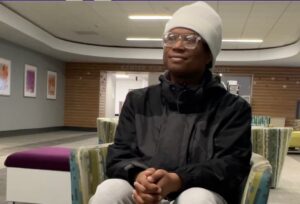
Meanwhile, Michael Singler feels that many mainstream media outlets focus on negative things. He would like to see more genuinely positive things happening in communities. “If mainstream media has more of a balance of positive and negative information in the news, it will create trust between viewers,” he said.
Aidon Brion, 18, a first-year student at Lansing Community College
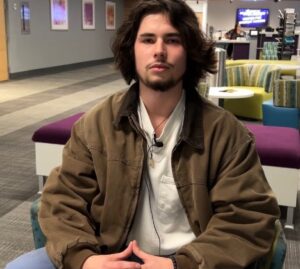
Aidon Brion expresses deep worry about the mainstream media. “I want more truth and I want objectivity. But I’m afraid I will never get that from mainstream media,” he said, adding that change is hard because they’re “so established.”
Allie Dearman, 25, a Lansing resident, studying in Texas
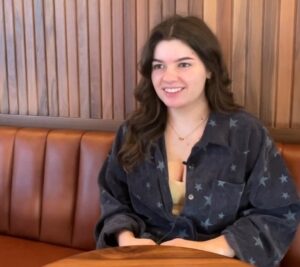
Like her peers, Allie Dearman wants to see less biased and negative information on mainstream outlets, and more facts. “I’d like to see more things that are happening that aren’t doom and gloom; and some sort of hope,” she said.
This is part of a series of posts from students at the Michigan State University Journalism School. The students will be covering four counties around Michigan during the 2024 campaign for the Detroit Free Press working with the American Communities Project typology.
